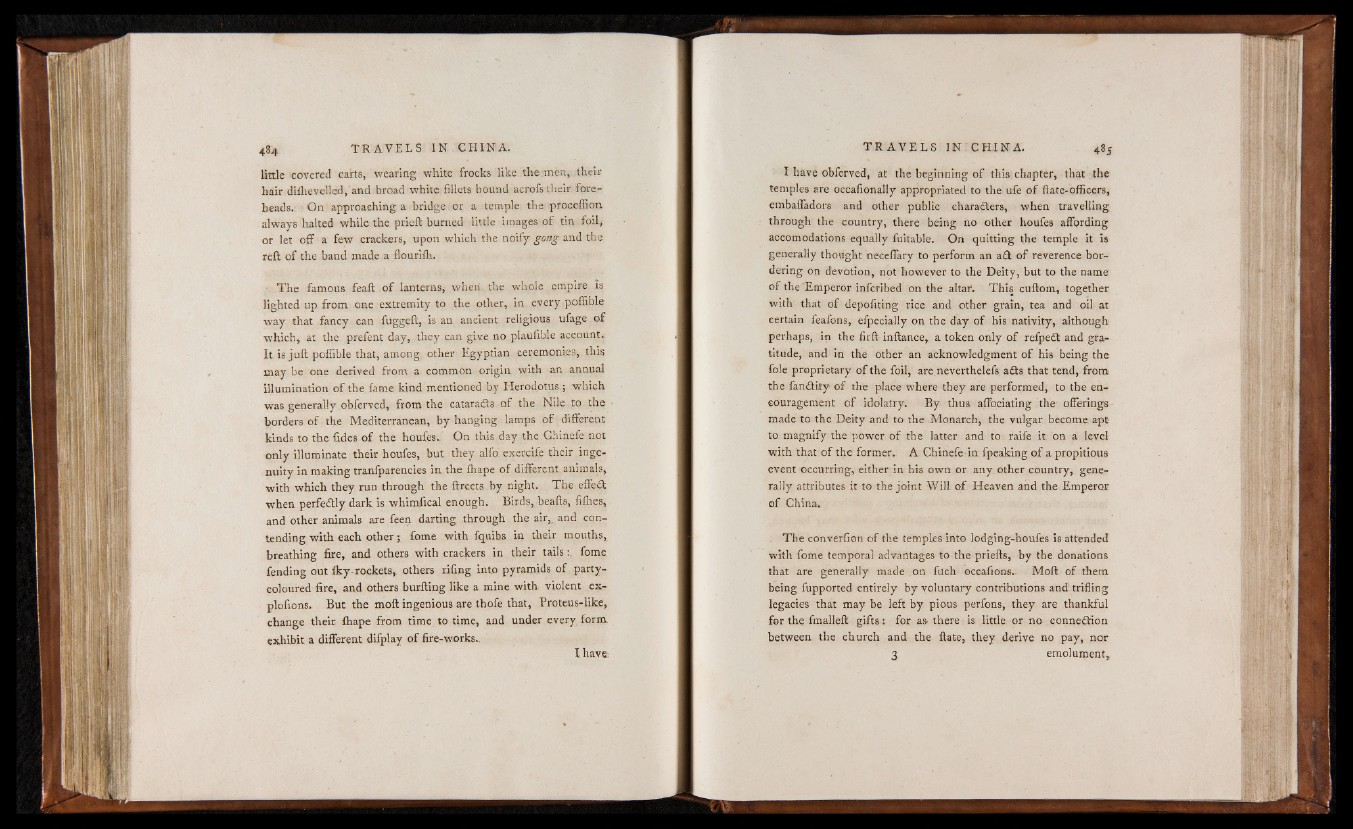
little covered carts, wearing white frocks like the men, their
hair diihevelled,'and broad white fillets bound acrofs their foreheads.
On approaching a bridge or a temple the procefiion
always halted while the prieft burned little images o f tin foil,
or let off a few crackers, upon which the noify gong and the
reft o f the band made a flouriih.
T he famous feaft o f lanterns* when the whole empire Is
lighted up from one extremity to the other, in every poffible
way that fancy can fuggeft, is an ancient religious ufage o f
which, at the prefent day, they can give no. plaufible account.
It is juft poffible that, among other Egyptian ceremonies, this
may be one derived from a common origin with an annual
illumination o f the fame kind mentioned by Herodotus ; which
was generally obferved, from the catarafts o f the Nile to the
borders o f the Mediterranean, by hanging lamps o f different
kinds to the fides o f the houfes.. On this day the Chinefe not
only illuminate their houfes, but they alfo. exercife their ingenuity
in making tranfparencies in, the fhape o f different animals,
with which they run through the ftreets by night. The effect
when perfedtly dark is whimfical enough. Birds, beafts, fifties,
and other animals are feen darting through the air,, and contending
with each other; fome with fquibs in their mouths,
breathing fire, and others with crackers in their t a i l s f ome
fending out iky-rockets, others rifing into pyramids o f party-
coloured fire, and others burfting like a mine with violent e x -
plofions. But the moft ingenious are thofe that, Proteus-like,
change their fhape from time to time, and under every form,
exhibit a different difplay o f fire-works.,
I have:
I have obferved, at the beginning o f this chapter, that the
temples are occafionally appropriated to the ufe o f ftate-officers,
embaffadors and other public characters, when travelling
through the country, there being no other houfes affording
accomodations equally fuitable. On quitting the temple it is
generally thought neceffary to perform an act o f reverence bordering
on devotion, not however to the Deity, but to the name
of the “Emperor infcribed on the altar. This cuftom, together
with that o f depofiting rice and other grain, tea and oil at
certain feafons, efpecially on the day o f his nativity, although-
perhaps, in the firft inftance, a token only o f refpedt and gratitude,
and in the other an acknowledgment o f his being the
foie proprietary o f the foil, are neverthelefs aits that tend, from
the fanitity- o f the place where they are performed, to the encouragement
o f idolatry. B y thus affociating the offerings
made to the Deity and to the .Monarch, the vulgar become apt
to magnify the power o f the latter and to raife it on a level
with that o f the former. A Chinefe in fpeaking o f a propitious
event occurring, either in his own or any other country, generally
attributes it to the joint Will o f Heaven and the Emperor
o f China.
The converfien o f the temples into lodging-houfes is attended
with fome temporal advantages to the priefts, by the donations
that are generally made on fuch occafions. Moft o f them
being fupported entirely by voluntary contributions and trifling
legacies that may be left by pious perfons, they are thankful
for the fmalleft gifts: for as there is little or no connexion
between the church and the ftate, they derive no pay, nor
3 emolument,